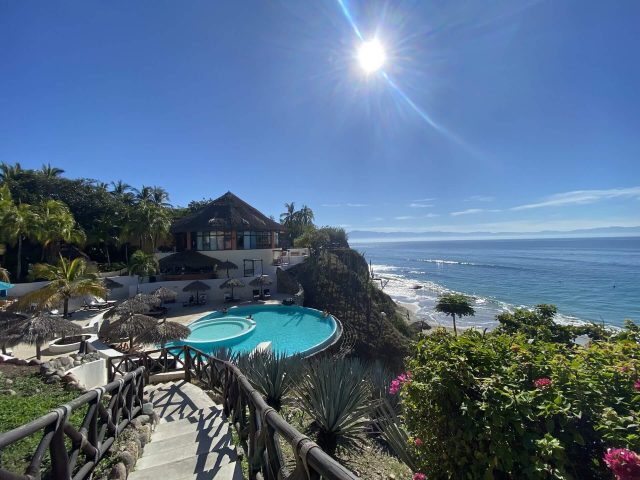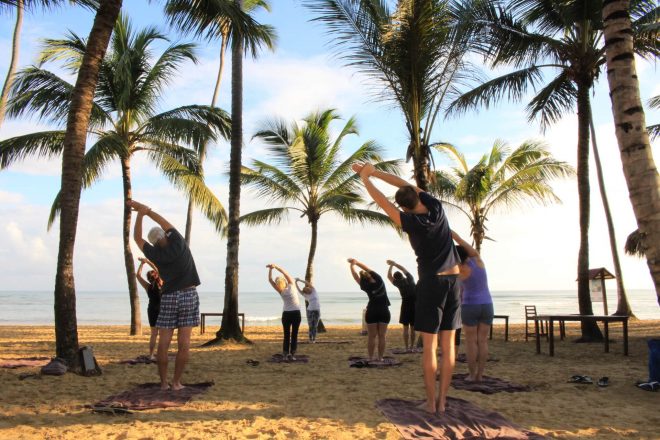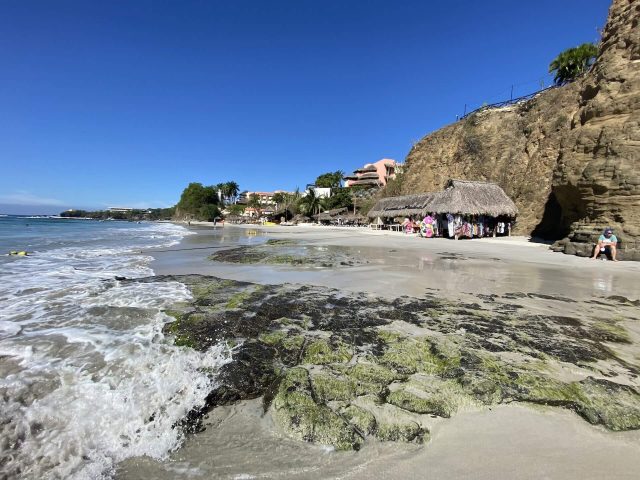As we celebrate Earth Day and consider what it means to return to travel, it’s important to delve deeper into how the industry impacts local communities and the environment. Contributor Chel Rogerson shares her experiences and food for thought from both the staff and guest side of all-inclusive resorts.
All-inclusives may or may not be your style. Personally, I prefer a more spontaneous and adventurous travel experience. I love those moments of meeting a stranger and ending up on their boat or crashing in a van with a traveler I met while surfing instead of a timetable of activities organized for me and a swim-up bar with unlimited alcohol.
But I get why many people choose all-inclusive hotels. In fact, I combed online reviews and spoke with travelers to understand what attracts people to all-inclusive stays.
Here are some benefits of staying at all-inclusives:
- They are stress-free and require little planning.
- Guests pay upfront and can accurately budget for the total cost of their vacation, avoiding unexpected expenses.
- They make guests feel safer with resort security.
- The many activities available and entertainment make it easy to please each individual in a large group or family.
- BONUS: It’s socially acceptable to over-eat, drink booze all day, and bask in the hedonism!

But the benefits of staying at all-inclusives come with some ethical considerations
A study by the European Tourism Futures Institute (ETFI) points out the impacts of all-inclusive tourism on local communities include poor worker wages and treatment, loss of local customs and traditions, devastation of the natural environment, and a stifling of small, local businesses (as tourists rarely spend outside of the resort).
Are you a Travel and Culture Content Creator?
Download the free Anti-Oppression Toolkit
An insider look at all-inclusive hotels
A few years back, I worked teaching yoga for a studio in the Dominican Republic, which contracted with all-inclusives in Punta Cana. I taught yoga classes at Dreams, Excellence, and Zoetry Resorts.
Here’s what that experience was like:
- I entered through the employee back entrance, where mounds of trash including plastic water bottles were stacked. At one resort, this created a long “corridor” of trash to the building. According to the ETFI report, Caribbean resorts produce twice as much solid waste as locals.
- Workers bused in from further towns congregated by the backside of the hotel looking tired and overworked, but had permanent, big smiles when interacting with guests. The ETFI reports most employment from these resorts are for low-wage positions, while the best positions are filled by foreign staff.
- Most guests thought it was dangerous to leave the resort, and marveled at how I could safely live outside of the resort walls.
Since then, I’ve read that some of these resorts have introduced socially responsible initiatives. In fact, Dreams Resort and Spa claims it’s an eco-friendly and sustainable resort with recycling and composting initiatives.

All-inclusives take over communities and privatize public beaches
Even with these promising steps towards social responsibility, many all-inclusives still claim exclusive use of what should be free public beaches for all in the community to enjoy.
Now, where I’m living in Mexico near the all-inclusives of Puerto Vallarta, surfers like myself are required to hire boats to surf breaks of beaches that only have private access by land.
For years, I have been surfing the few remaining public beaches in Punta de Mita, where locals continue to fight for access.
Some days, I’ve had to walk past armed guards put in place by private interests to intimidate surfers from entering. At the height of the conflict, the guards closed access and the surfers who resisted were pepper-sprayed at the access point.
Today, these once-deserted beaches in Punta de Mita, Mexico, now have exclusive beach clubs with umbrellas lined up along the coast, which are restricted to luxury resort guests only.
Punta de Mita is now a peninsula exclusive to the ultra-wealthy. But sincere conversations with some local fishing boat captains all tell the same story: local families lost their land so that The Four Seasons and other resorts could have exclusive access.
I was told by locals that they often lose access to running water because the resorts put too much pressure on the local infrastructure.

So why, knowing all of this, did I stay at Grand Palladium Vallarta Resort & Spa recently?
To be honest, I wanted to have a real guest experience on which to base my opinions. I wanted to open my mind and see the good side of these resorts that so many travelers seem to enjoy.
But my primary motivation: this resort sits in front of one hell of a surf break. I thought, “if you can’t beat ‘em, join ‘em.”
What surprised me staying at an all-inclusive
I wanted to hate the resort, I really did. I expected the food to be sub-par and to loathe being at a crowded pool surrounded by loud, tacky tourists. But, my friends and I enjoyed our short, 2-night stay.
The buffet food was low quality but the dinner restaurants that required reservation were exquisite. That said, the daily routine and repeating of food options would have been too much for a week-long stay.
I enjoyed being catered to by the staff and seeing their well-trained smiles. Still, this is a less authentic experience than being in a local restaurant or shop and talking with the owner to learn where they are from and why they decided to open the place.
The all-inclusive activities — specifically for me, the water sports — were a huge benefit.
If you have ever had to lug a heavy paddleboard out to the beach, you could appreciate having a board prepared and ready at the water’s edge.
By chance, I reserved a room that was apart from the family area. I was pleased to have a room by a quiet adults-only pool.
But, dude, if you want to party spring-break style, there’s a pool for you hosting dance contests and a nonstop DJ pumping reggaeton all day long. It seems there really is something for everybody.

Did I change my mind?
It’s still my preference to avoid traditional all-inclusive hotels. But, I’m more understanding of why guests choose them.
I watched families able to enjoy a vacation together with each individual getting to create their own experience: teens able to safely enjoy their autonomy, children having their own pool, and couples enjoying the quieter and more romantic areas of the resort.
While I was surfing in front of the Grand Palladium Vallarta, I could hear construction noise and looked back at the beautiful untamed shoreline to see a large crane erecting the next hotel along this strip of paradise.
It’s a matter of time before the new hotels will block off public access to enjoy and surf at that beach.
Soon, the beautiful untouched sand will be overcome with chairs and umbrellas being serviced with an endless supply of plastic cups and alcohol.
Adding Responsible travel to the luxury vacation experience
If you want to explore all-inclusive travel, it’s important to understand the ecological and social impact of your travel decisions.
If you love the all-inclusive style, maybe jump out of your comfort zone just once and see what life is like on the other side. Note how your experience changes and how the community around the resort is impacted.
I recommend you spend some time researching hotels that offer a more socially responsible experience. More eco-friendly, luxury niche options can become the mainstream if consumers demand more accountability.
For example, Casitas Maraika is just outside of Puerto Vallarta, Mexico, and is accessible by a short boat ride. It’s a charming, cabaña-style hotel that offers luxury, yoga classes, a beachfront restaurant, and epic weekly beach parties with live music — all while promoting sustainability.
I offer my yoga students half-day retreats there, where we enjoy getting back to nature in a secluded yoga studio with a peaceful, holistic vibe.
When you choose a hotel that adjusts its business operations to address these ethical considerations, let them know that’s why you chose them.
And, while you’re staying there, I suggest that you tip the staff generously to directly contribute to their wages (and don’t forget the yoga instructor!).
Want to learn more? You might like these:
- 5 Ways to Make Your Next Vacation a Force for Good
- Sustainable Tourism Practices to Be a Better Traveler
- How To Support Women-Owned Businesses When You Travel
- 6 Sustainable Shopping Tips to Start Using Right Now














































